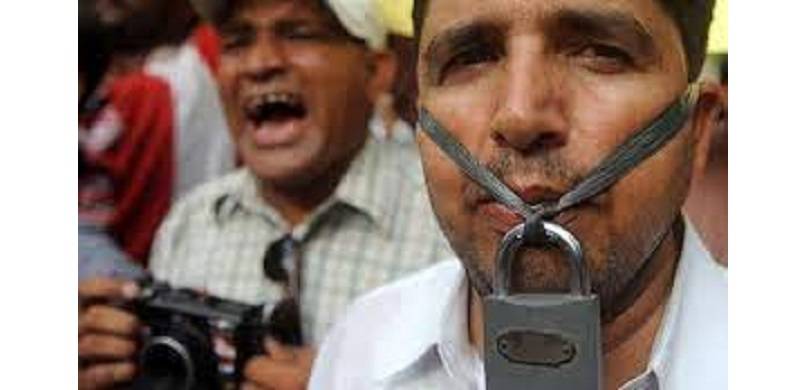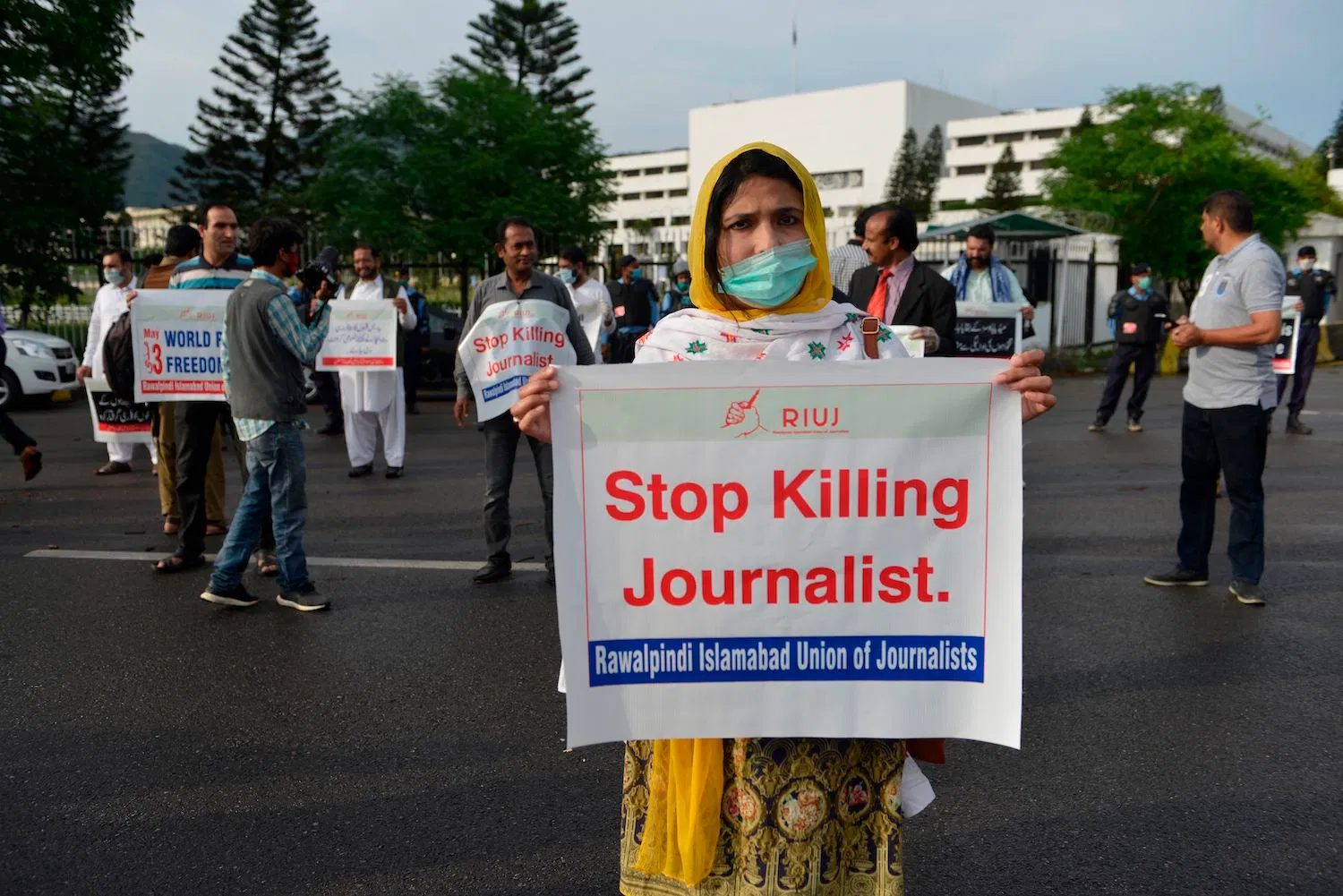
Reporters Sans Frontieres (RSF), an international media freedom watchdog, ranked Pakistan at number 145 in its World Press Freedom Index – a six-point fall in the ranking since 2018. Furthermore, the RSF has declared our prime minister to be one of the “predators of press freedom in the world.” Meanwhile, the Committee to Protect Journalists (CPJ), in its Global Impunity Index, includes Pakistan in the list of countries “where journalists are slain and their killers go free.” Freedom Network (FN), a Pakistani freedom of expression watchdog, noted a “dramatic escalation in the climate of intimidation and harassment of media and its practioners adversely affecting freedom of expression and access to information environment was discovered.” FN’s Annual State of Press Freedom Report states that 148 cases of attacks on media workers – including journalists – took place over the course of one year. According to this report, 27 legal cases were registered against journalists during this year, out of which 13 were registered under the infamous Prevention of Electronic Crimes Act (PECA).
However, all these facts about the state of media and journalists’ freedom in Pakistan emerged long before the leaked information in May 2021 about a proposal to merge existing media-related laws in the country. This proposal of introducing a single body to regulate – control would be the suitable word instead of regulate – all media outlets including newspapers, television, radio and internet-based media platforms is not merely an idea that was floated randomly. Similar schemes did appear during the government of Pakistan Muslim League-N (PML-N). Nevertheless, after strong resistance from the stakeholders including the All Pakistan Newspapers Society (APNS), the Council of Newspapers Editors (CPNE) and the Pakistan Federal Union of Journalists (PFUJ), the idea was shelved.
Fawad Chaudhry, during his first stint as the Federal Information Minister also floated the idea of a single regulatory body for media, but it could not materialise – perhaps due to a change in his ministerial portfolio.
Nevertheless, this proposal – the draft of which is still a secret – to repeal seven media related laws including the Newspapers Employees (Conditions of Services) Act of 1973, the Pakistan Electronic Media Regulatory Authority of 2002 and the Motion Pictures Ordinance of 1979 seems to be the final nail in the coffin of freedom of expression and the people’s right to know. While the government has kept the proposed bill extremely secret, the unofficially leaked draft Bill to establish the ‘Pakistan Media Development Authority’ (PMDA) is a clear negation of internationally recognised principles of media regulations.
A body having three federal secretaries and chairpersons of three governmental bodies as its members, and headed by a serving grade 21 or 22 officer, can never be an impartial and independent regulatory authority
In principle, a sectoral regulator should be impartial for market stakeholders, independent from government control and autonomous in its decision-making process.
However, the draft proposal shows that the members of proposed body will essentially be chosen by the federal government. A body having three federal secretaries and chairpersons of three governmental bodies as its members, and headed by a serving grade 21 or 22 officer, can never be an impartial and independent regulatory authority. Moreover, in the presence of the federal government’s power to issue binding directives, such a body will not be autonomous in its decision-making process. Furthermore, these members and chairman will be at the mercy of the president or federal government. According to the draft bill, both can remove them at their discretion.
Bringing in a law which will repeal seven federal statutes, in a secretive manner, is a sheer violation of democratic practices and participatory legislative process. One must remember that the bundling of seven federal laws relating to the elections and electoral process in Pakistan took more than three years of deliberation and debates, within and outside Parliament. A meaningful, participatory and consultative process is fundamental to ensure inclusion of views of all stakeholders. However, this non-transparent and exclusionary way of introducing such an important legislation creates serious doubts in the minds of stakeholders about the intentions of the government. This leads to the conclusion that the government intends to curb freedom of expression through this law rather than ‘regulating' the sector. 
As mentioned above, Pakistan’s existing media freedoms are already in a terrible state. Media outlets are being closed. Journalists are being harassed, threatened and tortured. A few of them have been abducted as well. Criminal cases are registered against working journalists under PECA and general criminal laws. Needless to say, free speech on television and the ability to write freely in the newspapers has become a story of the past. In this extraordinary time of censorship, internet-based media platforms – including online news websites, Twitter, Facebook and Youtube – became alternative sources to express news, views and analysis. This is mainly due to the absence of any legal/statutory obligation to register such platforms in the country. However, the current proposed media legislation requires “digital media” – which includes web TV, over the top TV and other such content made available for viewing over the internet – to get a licence for “the establishment, operation, maintenance and enforcement of such media” in the country. Moreover, all licenced media shall be under obligation to abide by highly subjective terms and conditions: for example, the preservation of the sovereignty, security and integrity of the Islamic Republic of Pakistan and protecting the national, cultural, social and religious values.
In a nutshell, the proposed PMDA is coming in to control the remaining dissenting voices emerging through online space
It is an established principle that no one can be judge of their own cause. Moreover, our Supreme Court, in ‘Government of Balochistan versus Azizullah Memon' (PLD 1993 Supreme Court 341) has declared that an administrative body like PMDA cannot adjudicate upon the rights of the citizens. Freedom of expression is a fundamental constitutional right and, according to the above referred judgement, it is the prerogative of the judiciary to decide about violations of the constitutional limits on this freedom. However, this proposed bill gives powers to the PMDA to not only investigate the alleged violations of this law but also empowers it to “adjudicate on complaints” as well. Moreover, this bill proposes to authorize PMDA to impose fines and other criminal penalties upon violation of the law. This is an obvious deviation from the Supreme Court ruling.
All of this makes the proposed PMDA a judge, jury and executioner at the same time.
In a nutshell, the proposed PMDA is coming in to control the remaining dissenting voices emerging through online space. In the presence of the draconian law known as PECA and provisions in the penal code relating to criminal defamation and sedition, this proposed law will further criminalise speech in Pakistan.
Many critics of this proposal have rightly termed it 'media martial law' as freedom of speech will no longer exist after the establishment of this body. This would ultimately impede citizens’ right to know – which is an essential element of a functioning democracy. If there is no freedom of expression and right to information, there will be no democracy.
The writer is an Islamabad-based media law expert and runs a social enterprise which undertakes research on legal, political and social issues

